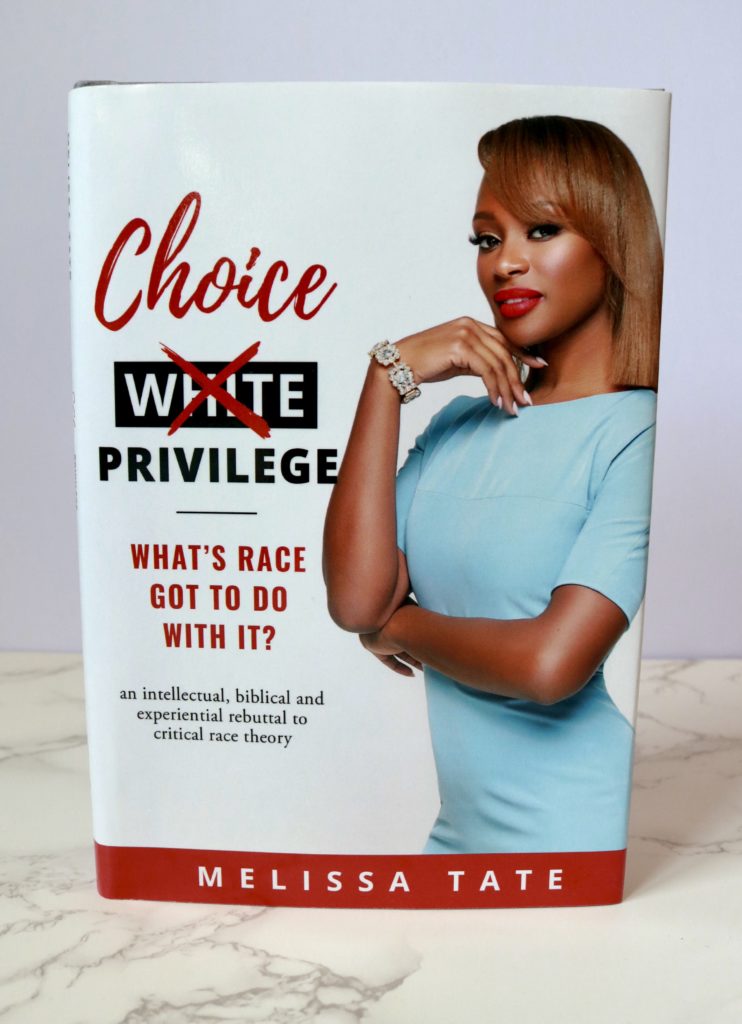
Choice Privilege: What’s Race Got to Do With It? An intellectual, biblical and experiential rebuttal to critical race theory
By Melissa Tate
According to the Progressive Left’s agenda and the Neo-Marxist ideology behind critical race theory, the United States of America is systemically racist against all people of color. If you are Black in America, you are oppressed by White oppressors and the entire American system (governmentally, academically, etc.) discriminates against you. Conversely, if you are a White American, you are born with unearned privilege and are a contributor to the deep racist roots this country was founded on.
Melissa Tate, an African-born immigrant to the United States who works as a Conservative Christian activist, doesn’t buy into this false narrative. Based on her “lived experience” (a term often used by Progressives), Tate argues that it is a person’s choices in life, not their skin color, that determines their life’s trajectory.
I first learned of Melissa Tate when she was a guest on The Candace Owens Show podcast and was fascinated by her story. When she detailed the upcoming release of her 2021 book, I followed her pre-order instructions and ordered her book. [Side note: her book has been a victim of cancel culture.]
Choice Privilege: What’s Race Got to Do With It? An intellectual, biblical and experiential rebuttal to critical race theoryby Melissa Tate is a book that is part memoir and part rebuttal to the political Left’s faux narrative that America is a systemically racist nation.
I found Choice Privilege incredibly insightful because of Tate’s perspective as a Black legal American immigrant.
Tate didn’t have the easiest life growing up in Zimbabwe and was raised in a single parent home where her mother prioritized faith and family while teaching Tate the importance of hard work, dedication, and discipline. It is interesting to study the differences between African culture and the neo-Black American culture, especially when considering economic disparities between African immigrants and Black Americans. For example, Africans place a high emphasis on faith, family and education while Black Americans are often considered “Uncle Toms” if they strive to seek or achieve these positive foundations for an abundant life.
To drive this point home, Tate digs through the reality of American history by exposing the cultural and economic success of African Americans during the post-slavery era up until the beginning of the Civil Rights era in the 1950s/60s. She, like other Black patriots, attributes the success of African Americans during this “forgotten” time to belief in God, children being raised in two-parent homes, and the entrepreneurial spirit of Blacks creating jobs and/or industries to benefit and serve their community (due governmental segregation).
In addition to her cultural upbringing, Tate credits her faith in God and her identity in Christ as the lens in which she views the world – full of hope, promise and opportunity, not because of anything she has done but because of who God is.
As someone who attended and graduated from an American University and later became an entrepreneur with her own employees, Tate denies she ever experienced oppression or opposition in America. She also claims to have received the same opportunities as Whites and owns the truth of Ephesians 2:10, believing she was made in God’s image on purpose and for a purpose. Likewise, Tate is a firm believer in the Christian worldview and its ability to open the eyes of the lost, blind, ignorant and confused. I found both her testimony inspiring as well as her obedience to follow God’s call to leave the business world so she can be a voice for Conservative Christians in America.
Moreover, Choice Privilege is packed with truth – statistically, factually, and biblically. Tate does a fantastic job of calling out the fallacy of “white privilege” by supporting it with numerous studies and other tales of “lived experience” from other Black Americans – she peels back the curtain on the Democratic Party and the Black narrative perpetrated by the Left.
Tate also spends a full chapter addressing postmodernism and Neo-Marxism by defining what these ideologies are and how they are infiltrating the United States. Once the reader understands these toxic ideologies, it’s easy to see how critical race theory has gotten indoctrinated within American businesses, the education system, the sports and entertainment industry, and pretty much everywhere else.
I particularly appreciated Tate’s in-depth discussion on CRT and the Black Lives Matter movement. I found myself learning new information about the origin and mission of BLM and it aggravated me, to say the least. Her exposure of the hidden agenda by BLM is reason alone to read this book. I pray more individuals will wake up and open their eyes to the damage and devastation of this movement on the community it claims to represent.
While Tate provides eye-opening perspective and statistics you won’t see or hear on mainstream media, she doesn’t leave the reader high and dry with more doom and gloom and hate-filled anger.
Tate concludes Choice Privilege by offering hope and pointing the reader back to the biblical foundation America was founded on and the importance of faith, family, liberty, and education (specifically, school of choice). Her proposal to win back our country from toxic ideology and destructive agenda is encouraging to me but also empowering to the Black community.
If you are looking to understand and learn about the racial tensions in the United States from an African-born, legal American immigrant, then you need to read this book. I always appreciate hearing testimonies and life stories and Melissa Tate’s is one that should be told and shared.
*I personally purchased this book. Any thoughts, opinions or endorsements are my own.